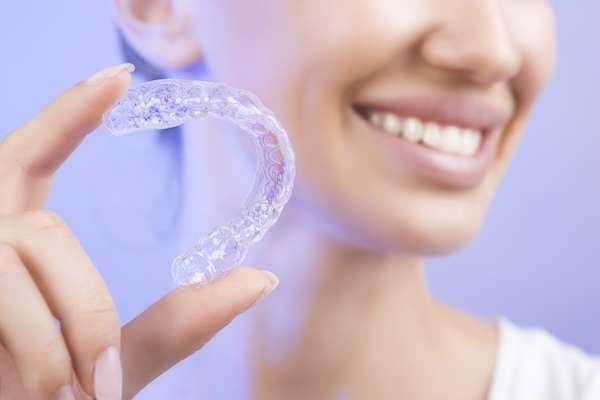 Having crooked teeth or an improper bite can affect a person’s dental health and smile, but an Invisalign® dentist can help patients achieve a straighter smile for years to come. Before beginning, patients first have a consultation with a dentist to learn more about the process. Asking questions is important for allowing patients to feel confident going into the treatment.
Having crooked teeth or an improper bite can affect a person’s dental health and smile, but an Invisalign® dentist can help patients achieve a straighter smile for years to come. Before beginning, patients first have a consultation with a dentist to learn more about the process. Asking questions is important for allowing patients to feel confident going into the treatment.
Frequently asked questions regarding the Invisalign® treatment process
For patients considering Invisalign®, it can be daunting trying to decide if this is the right solution for their unique situation. Learn the answers to several common questions patients have about clear aligners.
Who is a good candidate for treatment?
Generally, Invisalign® is only recommended for older teens and adults who have the lifestyle and discipline to wear the aligners as instructed. While a good solution for many types of common alignment and bite issues, there are certain limits to what conditions this treatment option can complete. If interested, patients should consult with an Invisalign® dentist who can examine the mouth and determine if the case can be addressed with aligners.
Are Invisalign® braces noticeable?
When comparing options for addressing misalignment of the teeth, Invisalign® is one of the most inconspicuous alternatives available to patients. Unlike traditional braces that most often require metal brackets and wires to be placed on the teeth with flashy rubber bands, clear aligners fit snugly over the patient’s teeth and are hardly noticeable when worn.
Are there any eating restrictions?
One major advantage of Invisalign® is that patients can easily remove the aligners at any time, making any diet changes unnecessary. It is recommended to always take the trays out when consuming any food or beverage that is not water. Brushing and flossing the teeth after meals can help keep the trays from staining or getting sullied.
How successful is Invisalign®?
For people with treatable cases, clear aligners are often an effective means of adjusting the position of the teeth and jaw. However, the success of treatment relies heavily on how compliant the patient is with following the guidelines. Unlike regular braces that are fixed onto a person’s teeth at all times, it can be tempting to remove Invisalign® whenever the teeth are uncomfortable. Additionally, people may misplace the aligners or forget to put the trays back on after meals.
To achieve the desired results, patients must wear the aligners at least 22 hours a day. If this requirement is not met, it may take longer to complete the process or the treatment may be unsuccessful. Additionally, patients need to continue wearing a retainer at night to keep teeth from shifting once in the proper position.
Check out what others are saying about our dental services on Yelp: Invisalign Dentist in Forest Hills, NY.
Conclusion
Come to your initial appointment with an Invisalign® dentist prepared with questions you want to ask, including the inquiries explored in this guide and any others about the treatment process. A productive consultation appointment facilitates realistic expectations and allows patients to understand what is required for the teeth to successfully shift into the desired position.
Request an appointment or call Gentle Touch Dental Care at 718-924-2387 for an appointment in our Forest Hills office.
Related Posts
Getting the All-on-4® overdentures procedure done involves a dentist implanting four titanium screws or rods into the upper and lower jawbone. This is a more stable alternative to removable partial dentures. It can be not easy to eat or speak with removable dentures, but with permanent dentures, patients can have more freedom and comfort while…
Individuals who struggle with symptoms of sleep apnea may not realize the help their dentist can provide by assessing or treating this sleep disorder. Dentists will often ask patients about their sleep habits to assess the possibility of an individual dealing with apnea, though there are other oral health signs that could lead to a…
Receding gums can be a symptom of gingivitis, the first stage of gum disease. It can also be caused by other factors, like a genetic predisposition to developing gum recession or bad brushing techniques.Gingivitis occurs when plaque and tartar make their way below gum tissues. The bacteria inside them infect gum tissues, leading to an…
